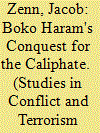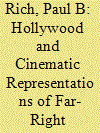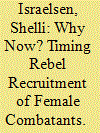|
|
|
Sort Order |
|
|
|
Items / Page
|
|
|
|
|
|
|
| Srl | Item |
| 1 |
ID:
172495


|
|
|
|
|
| Summary/Abstract |
This article explains how Al Qaeda in the Islamic Maghreb (AQIM)–trained Nigerian militants split from Boko Haram and formed a new group called Ansaru in 2011 after consulting with AQIM. Ansaru leaders, however, reintegrated with Boko Haram and transferred their specialized skills in kidnappings, suicide bombings, and media to Boko Haram and contributed to the group's conquest of territory in 2013. Al Qaeda did not benefit from these conquests because Ansaru leaders switched loyalties and helped arrange Boko Haram's pledge to Islamic State in 2015. This article exploits primary source documents from AQIM, Islamic State, and Boko Haram and contributes to the literature on splits and mergers and knowledge transfer between terrorist groups and Al Qaeda–Islamic State competition.
|
|
|
|
|
|
|
|
|
|
|
|
|
|
|
|
| 2 |
ID:
172492


|
|
|
|
|
| Summary/Abstract |
In re-evaluating the origins of Italian clandestine political violence groups in the early 1970s, this article sheds new light on overlapping processes of legitimation of violence that took place in that “transitional space” created by the 1968–69 social upheavals. Eschewing mono-causal explanations, this article points attention to how violence was legitimized at different levels: in the interaction between the movement and the “protest policing”; in the competing memories of the Resistenza that generated opposing extremes; and at an international/transnational level, where the Cold War and the mythology of the decolonization movements framed and inspired the choices of Italians terrorists.
|
|
|
|
|
|
|
|
|
|
|
|
|
|
|
|
| 3 |
ID:
172500


|
|
|
|
|
| Summary/Abstract |
There is a growing body of evidence to suggest that there has been a determined effort by Al Qaeda, and more recently Islamic State, to recruit petty and street criminals into their networks. Despite this, and increasing global concern, there exists very little scholarly literature exploring this phenomenon, particularly empirically grounded. This article directly addresses this gap in research, and is one of the, if not the, first to present an analysis underpinned by qualitative empirical interview data, collected from former extremists and active grassroots workers in the United Kingdom. The article determines that through religious and social justifications offered to reduce moral concerns, extremists encourage criminals to continue, intensify, and diversify their criminality, with intentions to fund violent extremist activity, or to create social unrest within society. Rather than attempting to change behavior, this is about reconstructing criminals’ motivations; a consideration that has wider implications for counterterrorism policy and operations.
|
|
|
|
|
|
|
|
|
|
|
|
|
|
|
|
| 4 |
ID:
172491


|
|
|
|
|
| Summary/Abstract |
This article examines the legacies of radical and terrorist pasts in Józef Piłsudski's “moral dictatorship” in interwar Poland. Leading figures of Piłsudki's government had been involved in the fight for Polish independence already during the years of the Russian Revolution of 1905. They joined the radical fighting squads of the Polish Socialist Party and participated in acts of political and economic terror. Exploring in detail the terrorist past of these later statesmen this article argues that their terrorist backgrounds were reflected in and shaped the nature of Piłsudki's leadership.
|
|
|
|
|
|
|
|
|
|
|
|
|
|
|
|
| 5 |
ID:
172498


|
|
|
|
|
| Summary/Abstract |
This article argues that a major influence on the imagery of far-right terrorism in the United States derives from cinema. Most of the feature films released by Hollywood on this theme have been rather superficial and have rarely strayed beyond portraying right-wing terrorist movements in popular genres such as westerns, crime thrillers, and romantic melodramas—although not, interestingly, action adventure movies, so often the terrain for narratives involving external terrorist movements. The article contends that U.S. far-right terrorism before the 1990s was anchored in the films depicting the Ku Klux Klan; more recently, a few films have begun to engage with “new” forms of far-right terrorism involving skinheads, neo-Nazis, and “patriot” militias. Overall, remarkably few films released by Hollywood have engaged with the structure of far-right terrorist movements or the motivations of their followers. This has ensured that the movements remained shadowy organizations run, for the most part, by two-dimensional and stereotypical characters.
|
|
|
|
|
|
|
|
|
|
|
|
|
|
|
|
| 6 |
ID:
172502


|
|
|
|
|
| Summary/Abstract |
The self-proclaimed Islamic State of Iraq and Syria (ISIS) and its supporters take measured steps to ensure the group's survival in the virtual sphere, despite continued efforts to undercut the organization. This study examines a time-bound sample of 240,158 Uniform Resource Locators shared among English-language ISIS sympathizers on Twitter to better understand how networks in the jihadisphere inoculate radical materials and communities online. A thematic but descriptive analysis of results illustrates the dynamic apparatus of digital communications leveraged by ISIS. Findings suggest a more comprehensive strategy to undercut ISIS's web of online information requires a similarly networked response by counterextremism practitioners.
|
|
|
|
|
|
|
|
|
|
|
|
|
|
|
|
| 7 |
ID:
172501


|
|
|
|
|
| Summary/Abstract |
Using six years of data (2011–16) drawn from the Global Terrorism Database and from other sources for 127 countries, a pooled cross-sectional time-series research design is employed to investigate whether the health of a country's labor market influences the number of terrorist incidents a country experiences. Results show a strong negative relationship between labor force participation and the frequency of terrorist incidents. Neither the youth unemployment rate nor the unemployment rate has a notable influence on predicting acts of terrorism. Findings also reveal that the percent of a country's population living in urban areas does not condition the relationship between labor force participation and terrorism. The observed effect of labor force participation has methodological consequences for how a country's labor market ought to be conceptualized in future research studies on terrorism. Such a finding also has relevant policy implications because it suggests that greater attention should be directed at devising ways for countries to enhance employment opportunities not only to improve economic conditions, but also to assist in the reduction of terrorism.
|
|
|
|
|
|
|
|
|
|
|
|
|
|
|
|
| 8 |
ID:
172494


|
|
|
|
|
| Summary/Abstract |
This article contributes to the understanding of the emergence, character, and significance of conspiracy theories on state–terrorism relations by providing a historical case study on the “Carlos–KGB [Komitet gosudarstvennoy bezopasnosti] conspiracy theory”: the fictional narrative that the “super-terrorist” Carlos the Jackal was an agent of the KGB, exploited against the Soviet Union's Cold War enemies. The analysis shows that the stories originated from disinformation operations of Western intelligence services, which were then spread by the news media, politicians, and Carlos himself. The mythical Carlos simulated through Cold War psychological warfare is deconstructed as a symbol of Soviet control of international terrorism.
|
|
|
|
|
|
|
|
|
|
|
|
|
|
|
|
| 9 |
ID:
172497


|
|
|
|
|
| Summary/Abstract |
Terrorists from a wide array of ideological influences and organizational structures consider security and risk on a continuous and rational basis. The rationality of terrorism has been long noted of course but studies tended to focus on organizational reasoning behind the strategic turn toward violence. A more recent shift within the literature has examined rational behaviors that underpin the actual tactical commission of a terrorist offense. This article is interested in answering the following questions: What does the cost–benefit decision look like on a single operation? What does the planning process look like? How do terrorists choose between discrete targets? What emotions are felt during the planning and operational phases? What environmental cues are utilized in the decision-making process? Fortunately, much insight is available from the wider criminological literature where studies often provide offender-oriented accounts of the crime commission process. We hypothesize similar factors take place in terrorist decision making and search for evidence within a body of terrorist autobiographies.
|
|
|
|
|
|
|
|
|
|
|
|
|
|
|
|
| 10 |
ID:
172493


|
|
|
|
|
| Summary/Abstract |
This article, providing an example of state support for terrorists, looks at the cooperation between the Stasi and the right-wing West German terrorist Odfried Hepp in the 1980s. Based on research in Stasi archives, the article explains that gathering information, rather than using him as a terrorist weapon in the Cold War, was the main motivator for the Stasi to cooperate with a high-profile neo-Nazi. By looking at the details of the Hepp-Stasi alliance, it assesses what forms, results, and dangers this relationship produced. The article challenges the myth of the all-mighty East German State Security and demonstrates that the dynamics of this alliance were not always in the Stasi's favour. In the absence of other instruments of coercion, the Stasi used the personal relationship between Hepp and his officers to control him. The article offers insights into Hepps's terrorist career but also the pragmatic way in which the Stasi built its network of informants outside the GDR. It also adds nuances to the understanding of the relationship between Socialist states and terrorists during the Cold War.
|
|
|
|
|
|
|
|
|
|
|
|
|
|
|
|
| 11 |
ID:
172499


|
|
|
|
|
| Summary/Abstract |
Research on jihadist online propaganda (JOP) tends to focus on the production, content, and dissemination of jihadist online messages. Correspondingly, the target of JOP—that is, the audience—has thus far attracted little scholarly attention. This article seeks to redress this neglect by focusing on how audiences respond to jihadist online messaging. It presents the findings of an online pilot survey testing audience responses to clips from English-language Islamic State of Iraq and Syria videos. The survey was beset at every stage by ethical, legal, and practical restrictions, and we discuss how these compromised our results and what this means for those attempting to do research in this highly sensitive area.
|
|
|
|
|
|
|
|
|
|
|
|
|
|
|
|
| 12 |
ID:
172496


|
|
|
|
|
| Summary/Abstract |
Using case study evidence, this article demonstrates how the relationship between conflict intensity, gender inclusive ideologies and gender inclusive policies on one hand, and the decision to recruit female combatants on the other hand, is conditioned by the groups' conflict phase. Conflict phases divide conflict events into two distinct parts, the guerrilla activity phase and the civil war phase, contingent on the insurgents' number of armed fighters, military capabilities, level of institutionalization and degree of territorial control. These conflict phases affect the recruitment behavior of insurgent groups making them more likely to recruit female combatants in the civil war phase and less likely to do so in the guerrilla activity phase.
|
|
|
|
|
|
|
|
|
|
|
|
|
|
|
|
|
|
|
|
|